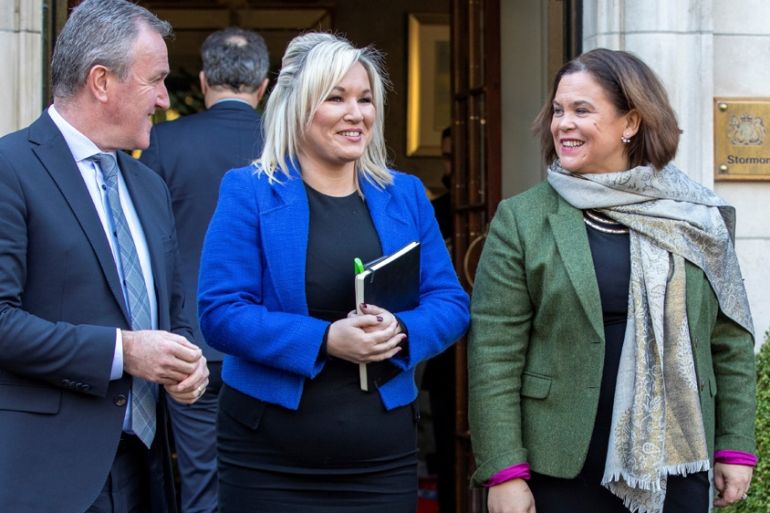Northern Ireland parties to revive power-sharing government
Agreement brokered by UK and Ireland is set to end the Northern Ireland Assembly’s longest suspension in 13 years.

Northern Ireland‘s rival Irish nationalist and pro-British unionist parties have agreed to a draft deal that revives a power-sharing government in the region.
Friday’s move comes three years after the government collapsed and left 1.8 million people with no regional government
Keep reading
list of 3 itemsExplained: Northern Ireland, Brexit and New IRA attacks
Northern Ireland marks 20 years since Good Friday Agreement
It paves the way to allowing the assembly to legislate on a wide range of issues and appoint regional government ministers.
The Irish and United Kingdom governments helped broker the deal between the Irish-nationalist Sinn Fein party and the Democratic Unionist Party (DUP), which would end the Northern Ireland Assembly’s longest suspension in 13 years.
Friday’s announcement came days before a Monday deadline that could have triggered fresh elections.
“The Sinn Fein Ard Chomhairle [party leadership] has met today and decided to re-enter the power sharing institutions. We now have a basis for power sharing and we’re up for that,” Sinn Fein leader Mary Lou McDonald told a news conference.
Sinn Fein had withdrawn from the power-sharing government exactly three years ago, saying it was not being treated equally by the DUP.
Since then both parties have blamed each other for a number of failed attempts to break the deadlock.
Numerous rounds of acrimonious negotiations failed to find an agreement and basic services were left unattended – eventually sparking workers’ strikes.
A power-sharing agreement is expected to help the province handle the pressures of Brexit.
A provision in the United Kingdom’s European Union withdrawal deal will give the Northern Ireland Assembly the right every four years to consider whether to maintain alignment with EU market rules.
Land border with the EU
Northern Ireland, which suffered through three decades of sectarian violence before the 1998 Good Friday Agreement, is the only part of the UK to have a land border with an EU nation, and the divorce deal ensures its border with the Republic of Ireland will remain open.
The DUP propped up a minority British government for more than two years until last month’s snap election, another stumbling block in the talks with Sinn Fein that UK Prime Minister Boris Johnson‘s emphatic general election victory on December 12 removed.
|
|
The two big Northern Irish parties’ share of the vote fell in those elections while budget issues in the health service, culminating in a strike by local nurses this week, also raised pressure on them to cut a deal.
Sinn Fein had been seeking increased rights for Irish-language speakers and a reform of the system of governance to prevent the DUP, the largest party, from blocking legislation using a clause from the 1998 peace deal to protect minority rights.
The draft deal offers a new cultural framework to “protect and enhance” the Irish language as well as the related Ulster Scots language, while meaningful reform of the so-called “petition of concern” mechanism would mean it would no longer constitute a veto for one party.
The influential Orange Order, a pro-British society that holds large annual parades and counts DUP politicians among its members, has said it opposed the deal due to the “far reaching” Irish language provisions.